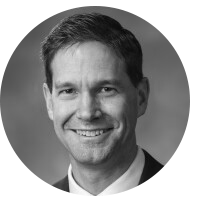For this first episode, we’re going to explore Matthew chapter six, and it’s a treat to focus on just one chapter. This allows us to truly dive in and explore. To catch us up, looking at this chapter within its context, it’s the middle chapter of three chapters on the Sermon on the Mount. In chapter five, Jesus began with the Beatitudes and then provided a series of upgrades to the law of Moses. Now, in chapter six, instead of saying, ‘You have heard that it has been said of them of old, but behold, I say unto you,’ and then giving you that higher love, the gospel, in chapter six, he’s going to take these common Christian behaviors—almsgiving, prayer, fasting, forgiving, things expected of any follower of Christ—and show us a pattern of how to become more like Him. So this part of the law of the gospel serves as a blueprint for proper Christian behavior. And diving into those Christian behaviors can also spark the question of how Mormons are different than Christians?
Understanding Jesus’s Teaching Methods
Let’s jump in with our first Christian behavior and observe how Jesus discusses this. Not in a manner of ‘doing things for the glory and honors of the world,’ but because we’re actually trying to become more like Jesus. It’s akin to those great General Conference talks on the subject given by President Henry Eyring in ‘Try, Try, Try.’ There’s a lot of symbolism here that ties into the notion that we just try a little harder to be a little better, and all of these require adjustments.
In fact, President Eyring, in a different talk, mentioned, ‘If you want to make major improvements in your life, don’t try to change big things, but rather, look for small things that get repeated often in your life, and make incremental improvements in how you do those little things. Over time, the cumulative effect is that you will see significant improvement.’ I think this aligns beautifully with what we’re going to discuss in chapter six. One of the teaching approaches Jesus seems to employ is using many case studies to teach key principles that should guide our lives. As we delve into this chapter, one of these key principles emerges right at the beginning: ‘Take heed that you do not your alms before men.’ The New International Version translates this as ‘be careful not to practice your righteousness in front of others, to be seen by them.’ That’s essentially the theme Jesus aims to convey with this principle.
He then uses several examples (almsgiving, prayer, and fasting) to illustrate how people have misused those righteous activities to show off their righteousness and suggests what disciples could do to engage in those good activities without showcasing their righteousness. As you read this, look for how Jesus uses examples to teach principles that can guide our lives. Some of you, upon hearing verse one, might pause and say, ‘Well, hold on, wait a minute. I thought back in chapter five, verses 14 through 16, the Savior had told the people, ‘Let your light so shine before men, that they may see your good works and glorify your Father, who is in heaven.’’ Now, some might be perplexed—how can we have it both ways? In one instance, it seems like he’s saying, ‘Let everybody see what you’re doing,’ and here he’s saying, ‘Don’t give alms before men to be seen by them.’
I don’t know all the reasons for why the wording is as it is here compared to chapter five, verses 14 through 16. But what’s interesting is that in the Matthew five account, he didn’t instruct you to do your work so that people would see you and honor you. Instead, he said, ‘Do your good works. Let your light so shine, that men may see your good works, and glorify your Father who is in heaven.’ You leave behind you a trail of good works without sitting around waiting for people to give you credit or a receipt for all the good things you’ve done. Especially with how service-oriented the LDS Church is, it can pose the question: is Mormonism Christian?
Historical Context and Speech
That ties in beautifully with what’s happening here in chapter six, verse one. The idea is to ‘not draw attention to yourself but to the good work, so others can glorify God rather than you.’ He then gives the opposite in verse two. Notice this: ‘Therefore, when you do a sign of alms, do not sound a trumpet before you, as the hypocrites do in the synagogues and in the streets, so that they may have the glory of men.’ Let’s be clear about the cultural setting and context, and how this would have resonated with those first-century Jewish disciples listening to this speech.
In fact, if you were to get into a time machine and go back 2000 years to Galilee, and approach anyone, asking, ‘Hey, I’m looking for a hypocrite, where can I find one?’ What would any Greco-Roman or Jewish individual in first-century Judea or Galilee say? They would likely direct you to the theater, as that’s where you’d probably find hypocrites, as they’d be putting on a play. The word ‘hypocrite’ in English comes from two Greek words, meaning ‘to interpret from underneath.’ It refers to Greek or Greco-Roman stage actors, as they lacked electronic voice amplification systems. Their theaters were designed to echo voices so actors could be heard. They’d hold up terracotta masks with funnels in the mouth, helping to project their voices. An actor could go offstage.
Imagine taking one terracotta mask, placing it down, shedding a cloak or costume, donning another, picking up a different mask, using distinct body language, movements, and altering your voice to take on a different persona on stage. People become so engrossed in that character that they’d have no clue it’s a different person. Look at your footnote; it says in Greek, ‘The Pretenders.’ The Greek word means ‘a play actor or one who feigns, represents dramatically, exaggerates a part.’ It’s someone who assumes a character, playing a role on stage, aiming to entertain or, in some cases, deceive an audience into believing the story, making it feel real, like reality. But once I step off stage, shedding the costume, I return home. I’m no longer that person I portrayed on stage in those four different roles as a Greco-Roman hypocrite.
Some might wonder, ‘What does this have to do with us today? Why should I care? And if this does apply to Christians, does it apply to Mormons? Are Mormons Christians?’ In our definition of hypocrite, it’s typically someone who says one thing and does another. However, in Jesus’s first-century context, this was potent. He’s essentially urging disciples to stop pretending, to discard the costume, remove the mask, the fake voices, and body language, and just be authentically you at your core, be genuine as a disciple of Christ. So, when giving alms, it’s about refraining from saying, ‘Hey, look at what I’m doing!’ Instead, perform the act of kindness without trying to play a character seeking applause from the congregation or the crowd.
Continuing into verse three, he says, ‘But when thou doest alms, let not thy left hand know what thy right hand doeth.’ Again, when Jesus teaches, sometimes we take these things so literally that we may miss the underlying principles. I mean, I can’t imagine any circumstance in my life where my left hand should not be in sync with my right hand. How would I drive a car or hold anything? So, as we listen to Jesus, we must also understand his ancient context; he’s illustrating a principle using clear examples that would have been very memorable and comprehensible phrases for the ancient listeners.
The point was to spark conversation, to clarify principles guiding people to live in ways that would draw them closer to God. It doesn’t mean you shouldn’t have coordination between your hands if you want to be a Little Reader. But the principle is, don’t seek to elevate yourself in the eyes of the world; magnify God. Let Him be the one magnified. These stories, these mini case studies, aim to encourage people to consider a core principle: ‘Do not display your righteousness; let God be expressed through you.’ So, that covers verses one through four. The reward in verse four is remarkable: ‘that thine alms may be in secret: and thy Father which seeth in secret himself shall reward thee openly.’
The Importance of Heartfelt Prayer
Moving to the section on prayer, starting in verse 11, ‘But thou, when thou prayest, enter into thy closet.’ If taken literally, the only place to pray would be in a closet. And if you lived in a culture without closets, you’d never be able to converse with God. So, we mustn’t interpret this extremely literally. He’s emphasizing that prayer’s purpose isn’t to seek praise from others but to commune with God. It’s an invitation to consider the principle; you can ponder other ways to connect with God without drawing attention to yourself. It could be in nature, a temple, a church meeting; there are numerous places. We shouldn’t confine Jesus to very specific things, thinking He only wants us to seek Him in closets.
In verse seven, he adds another aspect to the commandment on prayer: ‘But when ye pray, use not vain repetitions, as the heathen do.’ Vain repetition includes any word, phrase, or practice in prayer that allows me to zone out, merely go through the motions, or check the box saying, ‘Yep, I prayed today.’
These perspectives are helpful. There has been considerable discussion over the years about what constitutes vain repetition. The word ‘vain’ means empty, lacking purpose. So, the invitation here is for authenticity, for prayers to have purpose and meaning. It reminds me of my son David when he was a child; we taught him about the importance of avoiding vain repetitions in prayers. For several weeks, every night, he’d pray, ‘Lord, help me not to have vain repetitions in my prayers,’ making us realize that might be a vain repetition in itself.
I have a friend serving in the Stake presidency who shared an intriguing thought. He wondered if we might make the sacrament prayers a form of vain repetition. Seeing as Mormons do the sacrament prayers, what’s the difference between Christianity vs Mormonism? How often do we genuinely contemplate the words of the prayer? What if the young men rush through the prayer without taking a pause after the song? His point was about engaging in purposeful prayer. These might be some ways of understanding what Jesus meant by vain repetitions.
In verse eight, he makes another point, ‘Be not ye therefore like unto them: for your Father knoweth what things ye have need of, before ye ask him.’ When I kneel to pray, I’m not teaching God anything He doesn’t already know perfectly. He commands us to pray not because He needs to discover things about us but because we need to discover things about ourselves and Him in the attitude of prayer. So, when I pray, I seek to understand what God already knows about me and my day.
Jesus then introduces the ‘Lord’s Prayer,’ not insisting we recite those exact words for eternity but providing a pattern based on principles. It offers a structure and an idea of the kind of things we should talk to God about. So, don’t feel bound to repeat word for word. Instead, ponder on the principles Jesus presents.

By Dr. Tyler Griffin, Source Expert
Dr. Tyler Griffin embarked on his professional journey by teaching seminary courses for a period of six years in Brigham City, Utah. Following that, he dedicated the subsequent seven years to instructing at the Logan LDS Institute, located adjacent to Utah State University. Alongside his participation in the Seminary Preservice program, he spearheaded and supervised the implementation of the online seminary program. Dr. Griffin has been an educator at BYU for well over a decade and holds a co-founding position within the BYU Virtual Scriptures Group. His undergraduate degree is in Electrical Engineering, while both his master’s and doctorate degrees center around Instructional Technology. Dr. Griffin is the exclusive author of “When Heaven Appears Distant” co-author of “Come Unto Me: Illuminating the Savior’s Life, Mission, Parables, and Miracles” and co-editor of “Millions Shall Rediscover Brother Joseph.”

By Dr. Taylor Halverson, Source Expert
Dr. Taylor Halverson is a biblical scholar and instructional technologist. He serves as an Entrepreneurship professor in the BYU Marriott School of Business, where he contributes to the development of groundbreaking resources for BMC, including ScripturePlus and the Come Follow Me video series.

Fact Checked by Mr. Kevin Prince, Source Expert
Kevin Prince is a religious scholar and host of the Gospel Learning Youtube channel. His channel has garnered over 41,000 subscribers and accumulated over 4.5 million views. Mr. Prince also created the Gospel Learning App, a reliable platform where individuals seeking truth can access trustworthy answers to religious questions from top educators worldwide.
About Mormonism Explained
Mormonism Explained is a resource that was designed to provide objective and factual information about Mormonism, its history, doctrines, and policies. Our team of researchers consults experts and primary sources to present factual information on a variety of topics relevant to the Mormon Church.
Tags

